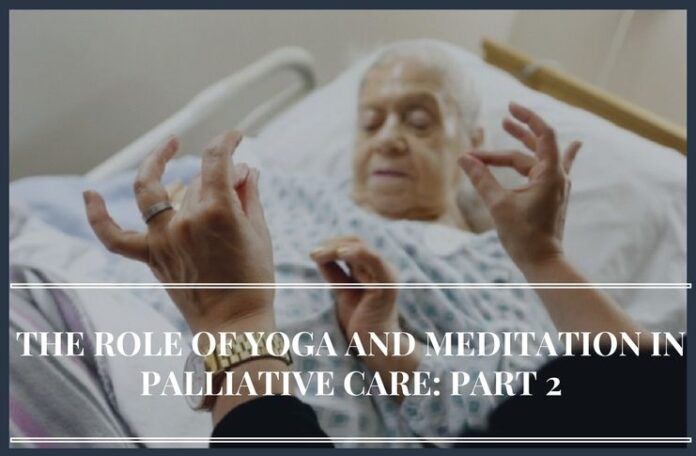
Palliative care espouses yoga and meditation
Part 1 of this series can be ‘accessed ‘ here. This is Part 2.
[dropcap color=”#008040″ boxed=”yes” boxed_radius=”8px” class=”” id=””]I[/dropcap]ndian spirituality elucidates the belief that our real self, the soul, is immortal. Death is merely a change of state from one physical existence to another; it is a bridge between lives when we take a leap from one form of matter to another. The human existence is considered to be physical, as well as spiritual or subtle. Death is the end of physical continuity but there is something that remains and lives even beyond physical death. That eternal substance is the soul, the spiritual substance which is what transmigrates to other lives.
Healing is very different from curing. Healing means trying to understand and accept one’s medical fortune and accommodates one’s life to the medical condition.
In the medical world, there have been enormous studies conducted in an attempt to establish the fact that patients should try to move towards spirituality, especially in cases of terminal diseases when death is inevitable. Spirituality helps minimize suffering and expands hope towards a peaceful finitude. It helps the patients and their family members maintain a positive atmosphere while preparing for the final passing. There is now an ever increasing need for health professionals to recognize the need for providing spiritual support to their patients in addition to the physical treatment plan, to ensure that the patient lives in peace and passes with dignity.
Spiritual well-being and depression are inversely related. Studies have proven the relation between spirituality and relief from major concerns such as anxiety, depression, pain and psychological distress in palliative care. People who have received some form of spiritual support tend to have a greater efficiency in the hypothalamic-pituitary-adrenal system in response to painful stimuli and the release of important elements such as serotonin and dopamine into the brain. Spiritual well-being reduces the counts of immune cells involved in stress.
[dropcap color=”#008040″ boxed=”yes” boxed_radius=”8px” class=”” id=””]P[/dropcap]eople with incurable diseases often try to seek answers for their situation about why they and not others are the victims of such terminal medical conditions? Why do they not stand a good chance of survival? They also harbor anger, frustration, helplessness, hopelessness and fatigue from their everyday medical parades of medicines and medical consultations. They are saturated to a point where the struggle is the other word for life and in such times, spirituality seems to be one ray of hope for understanding the meaning of their life, to see connections and start developing hope to manage their life, if not cure their disease.
Given the growing number of practitioners of yoga and meditation, it is increasingly important for providers in the medical and health profession to include spiritual training and nurturing in healthcare.
Healing is very different from curing. Healing means trying to understand and accept one’s medical fortune and accommodates one’s life to the medical condition. Healing involves a sense of coping rather than curing. Spirituality
is all about healing cognitive powers and preparing the body to face medical outcomes.
[dropcap color=”#008040″ boxed=”yes” boxed_radius=”8px” class=”” id=””]I[/dropcap]n a systematic review of published data from 26 surveys in 13 countries, the use of complementary or alternative medicine (CAM) in adult cancer populations ranged from 7% to 64%, with an average prevalence across studies of 31.4%. A US survey found that 91% of cancer patients (n= 752) reported using at least one form of CAM while receiving treatment. In the UK and US, complementary therapies are widely available to people with the incurable progressive disease through palliative care services and appear to be highly valued by service users. Yoga is one of the most popular complementary therapies in the Western world.
A pilot study of 14 African American men with a history of prostate cancer found that most had discussed spirituality and religious beliefs with their physicians. They expressed a desire for their doctors and clergy to be in contact with each other. Another study of advanced cancer patients in New England and Texas assessed their spiritual needs. Almost half (47%) reported that their spiritual needs were not being met by a religious community, and 72% reported that these needs were not supported by the medical system. When such support existed, it was positively related to improved quality of life. Furthermore, having spiritual issues addressed by the medical care team had more impact on increasing the use of hospice and decreasing aggressive end-of-life measures than did pastoral counselling.
[dropcap color=”#008040″ boxed=”yes” boxed_radius=”8px” class=”” id=””]G[/dropcap]iven the growing number of practitioners of yoga and meditation, it is increasingly important for providers in the medical and health profession to include spiritual training and nurturing in healthcare. From physicians to those providing pastoral care, caregivers should become acquainted with the philosophy behind yoga and meditation in order to provide this additional healing dimension to alleviate patient suffering, particularly at a time when they need it most. It is highly recommended that care givers understand the logic behind meditative practices and yogic devices by gaining wisdom into the health benefits of such powerful modes of psychosomatic healing.
Research studies on the role of spirituality in healing techniques and many other pilot programs now make us believe that there is a strong coherence between Palliative care and spirituality since spirituality makes palliative care much more beneficial and result oriented. A majority of such studies have established a very significant growth in psychological sustenance and symptoms management with the aid of spiritual knowledge. It is distinctly evident that spiritual practices and palliative care have a great future together.
This article has been coauthored by Dr. Mona Rawal, PhD. Faculty at the Foothill College, California
Note:
1. The views expressed here are those of the author and do not necessarily represent or reflect the views of PGurus.
- ModiCare – not enough to modify years of neglect! - April 23, 2018
- Gorakhpur Death-A Clarion Call to Change the Rotting Health System - September 22, 2017
- Paradise lost to violent radicals – Basirhat: a case in point - July 11, 2017










